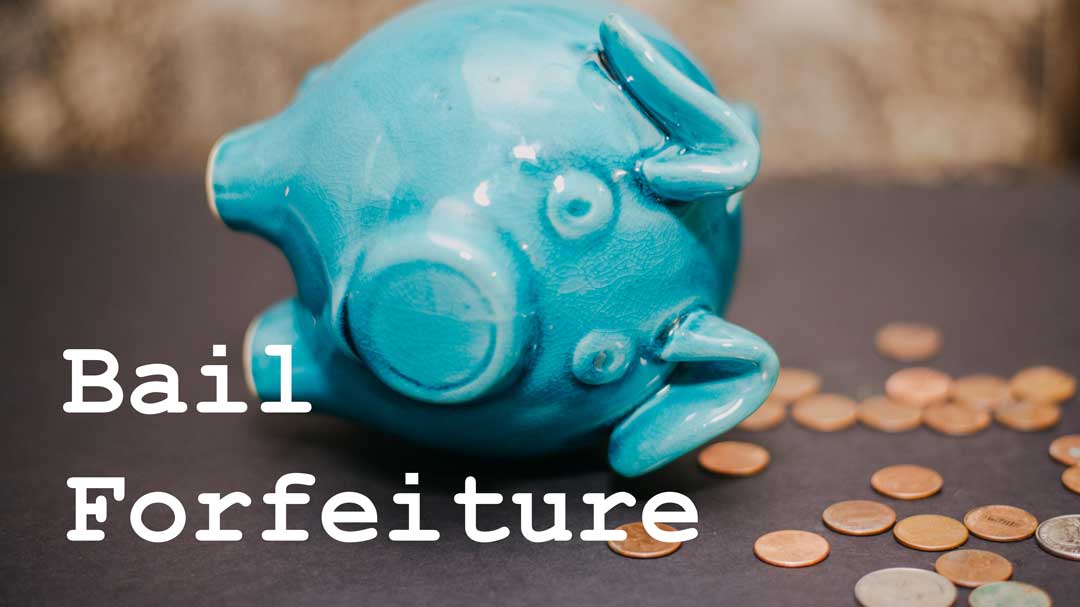3 min read
What Does Bail Forfeiture Mean?
Defining the term “forfeit” is key to answering “what does bail forfeiture mean?” To forfeit means that something is lost or surrendered as a...

One of the most common questions we get here at Frank Calabretta’s Bail House is, “What does bail forfeiture mean? Put simply, bail forfeiture is when a defendant does not appear at their appointed court date without having a valid excuse, so the bail is forfeited to the court system.
Bail forfeiture can also occur at any time prior to the pronouncement of judgment, if the defendant is supposed to be in court, before a judge, or if the defendant fails to surrender after appeal. When this happens, a judge in California must declare the bail amount forfeited in open court.
At that point, a court order is typically issued allowing the court to keep the bail money. The other option in this scenario is that either the bail bond company must locate and surrender the defendant within 180 days with no financial consequences to them, or they must pay the original bond amount to the court system.
In certain counties in California bail forfeiture can be used to obtain release from arrest and also to close a case. In these instances, most of the cases involve traffic violations or other minor misdemeanors. The defendant will post bail to be released from custody and will vow to appear in court on a prearranged date.
If the defendant does indeed appear at court, on the specified date, he can choose to contest the case, and if he wins, the bail amount will be returned. If the defendant does not appear without a valid excuse, then bail is forfeited, the court legally keeps the money, and the case is considered closed.
In many instances, the bail money that is posted actually belongs to a friend or family member who paid it to secure the release of the defendant. The only way to go about getting the money back when bail is forfeited, is for the loved one to actually collect it from the defendant themselves. Many courts in California will require the authorization of the person who posted the bail for the defendant before allowing the funds to be released for voluntary bail forfeitures.
In certain cases there may be no friend or family member who is able or willing to post bail for the person who is arrested. In this case the defendant may then choose to seek help from a bail bondsman at a bail bond company such as Frank Calabretta’s Bail House in Auburn, CA.
The bail bondsman charges a fee to post bail, which is usually a certain percentage of the bail amount, and then puts up his own funds in order to secure the timely release of the defendant from jail. If the arrested party does not appear at their specified court date, the bail bondsman can sue the defendant’s estate, or the defendant him or herself for the money to be repaid.
If the case becomes extreme or the defendant disappears, the court may be asked by the bail bondsman for a delay in bail forfeiture, so that he can hire a bounty hunter to find the defendant and bring him or her into custody before the extended forfeiture deadline.
If you find yourself in the unfortunate situation of being arrested, don’t just search for “bail bonds near me,” online because not all bail bond companies are created equal! Here at Frank Calabretta’s Bail House we make it a priority to treat our clients with the dignity and respect they deserve.
At Frank Calabretta‘s Bail House we offer affordable bail bonds with a commitment to professionalism, timeliness, and friendly service. We have been in business for over 40 years in the Placer community and are proud to be able to provide affordable bail bonds when people need them most.

3 min read
Defining the term “forfeit” is key to answering “what does bail forfeiture mean?” To forfeit means that something is lost or surrendered as a...

A person who has been arrested for most misdemeanor and non-violent crimes may post an amount of money (bail) that will allow his or her release...

2 min read
When someone is arrested and requires bail to secure his or her release from jail, a co-signer can play a crucial role in the process. Co-signers...